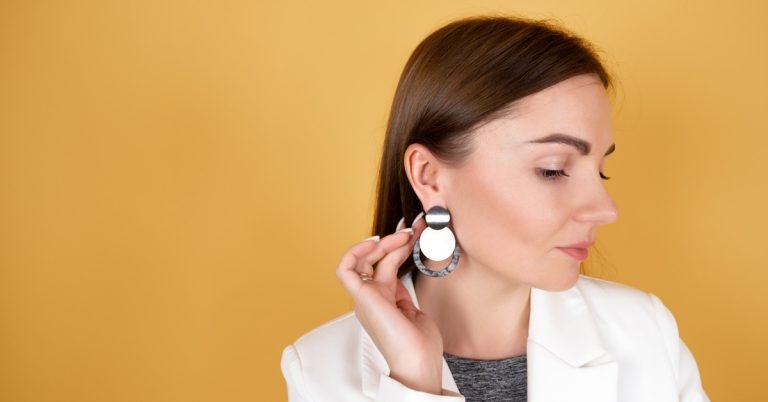What Earring Metals Are Hypoallergenic
Earrings are a great way to make a fashion statement and show off your personal style. But if you have allergies, it’s important to choose hypoallergenic earrings so you don’t end up with an itchy rash or other uncomfortable symptoms.

There are several metals that are known for being hypoallergenic, which means they won’t cause any reactions in most people. In this article, we’ll cover the different types of metal that are considered hypoallergenic, along with some tips on how to take care of them so they stay looking their best.
Table of Contents
Key Takeaways
- Hypoallergenic metals include stainless steel, titanium, niobium, high-karat gold, and platinum.
- It is important to check with a doctor before wearing any jewelry and to patch test for allergies to metal particles.
- Gold earrings may contain trace amounts of nickel, but can be treated to prevent reactions.
- Titanium is naturally nickel-free and strong, making it a popular choice for hypoallergenic earrings.
What are Hypoallergenic Metals?
Hypoallergenic metals are those that are less likely to cause an allergic reaction or irritation for the wearer. When shopping for jewelry, it’s important to consider buying earrings made from hypoallergenic materials. These metals can include stainless steel, titanium, niobium, and high-karat gold.

Each of these has its own unique look and styling ideas, so you can find something that suits your style. Gold is a great choice if you’re looking for a classic, timeless piece of jewelry. Gold earrings come in several different karats; the higher the karat number, the less alloy metal used in making the earring.
Higher carat golds like 18k or 24k will be more expensive than lower carat ones such as 10k or 14k, but they may also be less likely to cause an allergic reaction due to having fewer non-gold alloys mixed into them. When choosing an earring metal that’s hypoallergenic, it’s important to always check with your doctor before wearing any kind of jewelry just to make sure it won’t irritate your skin or trigger any allergies.
With careful consideration of material and design choices when selecting your next pair of earrings, you can ensure that you’ll remain comfortable and stylish without compromising on safety. With this knowledge in hand, now you can start searching for the perfect pair!
Gold
Rich and shimmering, gold earrings bring a touch of elegance to any outfit. Gold is an alloy made up of copper and zinc, but many people with allergies or sensitivities to copper can wear gold without experiencing an allergic reaction. This is because the amount of copper in gold is low enough that it does not cause any irritation.
However, some people have nickel sensitivity which makes wearing gold earrings more difficult as nickel can be found in alloys used to make jewelry. While there are hypoallergenic gold pieces available on the market, it’s best for anyone with nickel sensitivity to consult their doctor before making a purchase.
Not only will they be able to advise on what metals are safe for them, they may also be able to recommend specific brands or retailers who specialize in hypoallergenic jewelry. With the right knowledge and research, finding hypoallergenic gold earrings doesn’t have to be a challenge.
Moving onto silver…
Silver
Sparkling silver jewelry can instantly add a touch of sophistication to any ensemble. Silver is a popular choice for jewelry, but it’s important to be aware that some people may have an allergic reaction to silver jewelry.

While there are some individuals who are allergic to silver, the majority of people can wear sterling silver without irritation or adverse reactions. Those with allergies should pay special attention when choosing an earring metal as certain types of silver jewelry contain allergenic metals such as nickel and copper.
Silver allergy is often confused with other skin conditions, so if you think you may be sensitive to silver, it’s recommended that you consult your doctor before wearing any type of metal earrings. If they determine that you might be allergic, then look for hypoallergenic earrings made from sterling silver which has been verified by a third-party lab as being free from allergenic metals such as nickel and copper.
Here are four tips on how to choose hypoallergenic sterling silver earrings:
1) Look for earrings certified by the Assay office in England;
2) Check for labels like ‘Nickel Free’ or ‘Hypoallergenic’;
3) Ensure the metal content is stated on the label; and
4) Ask your jeweler whether their items are made from pure sterling silver or alloyed versions containing alloys of other metals.
-
Product on sale
 Exquisite Design Ladies WatchOriginal price was: $63.00.$27.00Current price is: $27.00.
Exquisite Design Ladies WatchOriginal price was: $63.00.$27.00Current price is: $27.00. -
Product on sale
 Hip Hop Sunglasses For WomenOriginal price was: $23.00.$15.00Current price is: $15.00.
Hip Hop Sunglasses For WomenOriginal price was: $23.00.$15.00Current price is: $15.00. -
Product on sale
 Metal Frame Hexagon Sunglasses UV400Original price was: $23.00.$15.00Current price is: $15.00.
Metal Frame Hexagon Sunglasses UV400Original price was: $23.00.$15.00Current price is: $15.00. -
Product on sale
 Vintage Unisex Sport EyeglassesOriginal price was: $26.00.$15.00Current price is: $15.00.
Vintage Unisex Sport EyeglassesOriginal price was: $26.00.$15.00Current price is: $15.00. -
Product on sale
 Vintage Square SunglassesOriginal price was: $30.00.$15.00Current price is: $15.00.
Vintage Square SunglassesOriginal price was: $30.00.$15.00Current price is: $15.00. -
Product on sale
 Cat Eye Women’s Sunglasses UV400Original price was: $24.00.$12.00Current price is: $12.00.
Cat Eye Women’s Sunglasses UV400Original price was: $24.00.$12.00Current price is: $12.00.
Silver jewelry offers many benefits – it looks great and is very affordable – however those with allergies need to take extra precautions when shopping for this type of accessory. Without proper care, wearing certain types of earrings could cause skin irritation or worse still, long-term damage due to contact dermatitis.
With these considerations in mind, selecting hypoallergenic sterling silver earrings can help ensure maximum comfort while still looking stylish and elegant. Taking into account all these factors will help make sure that your next set of beautiful earrings won’t leave you feeling uncomfortable or worse yet in pain!
Now let’s move onto discussing platinum…
Platinum
Treat yourself to the luxurious look of platinum jewelry and experience the elegance it brings. Platinum is one of the most hypoallergenic metals available, making it a great option for those with sensitive skin.
It is also resistant to tarnishing which makes it an ideal choice for those who want to keep their jewelry looking its best over time.
When choosing styles in platinum, there are many options from plain bands to intricate designs that can be used as everyday pieces or special occasion accessories. If you’re curious about earring sizes for cartilage piercings, don’t miss our article on What size earring for cartilage piercing. And if you’re wondering about standard earring post lengths, check out How long is a standard earring post for all the details.
When selecting items made from this metal, selecting ones that are 95-98% pure will help you avoid any possible reactions. This purity level ensures that your piece will not contain any impurities such as nickel or cobalt that could trigger allergic reactions in some people.
Additionally, opting for heavier designs can help ensure better quality and longer lasting wearability since lighter styles may bend more easily over time. Platinum provides an elegant look with its timeless appeal and durability; however, due to its softness, scratches can occur more easily than other metals such as gold or titanium.
So, regular maintenance should be taken into consideration when wearing these pieces on a daily basis. To transition into the subsequent section about titanium without saying ‘step’, consider exploring how titanium differs from platinum in terms of hypoallergenicity and durability while continuing to evaluate which metal works best for you and your needs.
-
Product on sale
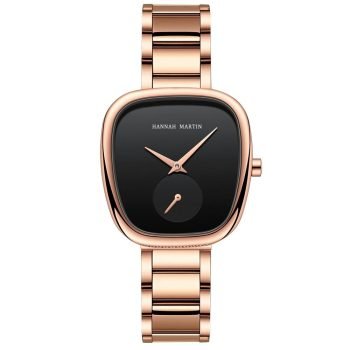 Elegant Bracelet Wristwatch For Women$28.00 – $34.00
Elegant Bracelet Wristwatch For Women$28.00 – $34.00 -
Product on sale
 Luxury Fashion Womens Wallet$11.00 – $15.00
Luxury Fashion Womens Wallet$11.00 – $15.00 -
Product on sale
 Dressy Ladies Wrist Watch$27.00 – $37.00
Dressy Ladies Wrist Watch$27.00 – $37.00 -
Product on sale
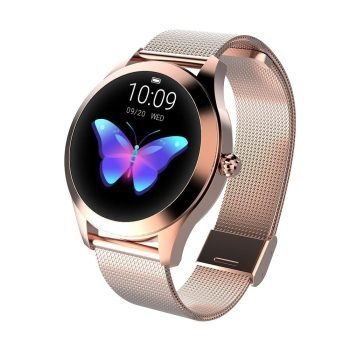 Butterfly Waterproof Smartwatch for WomenOriginal price was: $89.00.$61.00Current price is: $61.00.
Butterfly Waterproof Smartwatch for WomenOriginal price was: $89.00.$61.00Current price is: $61.00. -
Product on sale
 OLEVS Ladies Luxury Waterproof WatchOriginal price was: $416.00.$37.00Current price is: $37.00.
OLEVS Ladies Luxury Waterproof WatchOriginal price was: $416.00.$37.00Current price is: $37.00. -
Product on sale
 Classic Clock Leather Wristwatches Multiple Colors$26.00 – $28.00
Classic Clock Leather Wristwatches Multiple Colors$26.00 – $28.00
Titanium
Titanium’s durability and strength make it a great choice for jewelry that stands the test of time. Plus, choosing titanium is also beneficial due to its hypoallergenic nature, meaning anyone wearing titanium can do so without worrying about allergic reactions.
Titanium is lightweight yet highly resistant to corrosion, making it a popular choice for those looking for earrings that will last. Its non-reactive properties mean you’ll never have to worry about discoloration or damage from exposure to moisture or other elements while wearing titanium jewelry.
Furthermore, titanium is an ideal metal for those with sensitive skin as its low reactivity eliminates the risk of irritation caused by other metals like nickel and copper. All in all, titanium offers a great combination of style and lasting quality along with being hypoallergenic – an unbeatable combination when searching for the perfect pair of earrings. Be sure to check our post on how to choose the right earrings.
Transitioning onto stainless steel now, this malleable metal has become increasingly popular in recent years due to its versatility in fashion statements…
Stainless Steel
If you’re looking for a versatile, stylish metal to add something special to your look, stainless steel is the perfect choice! It’s one of the most popular hypoallergenic metals due to its composition of iron and chromium that are resistant to rust. Many jewelry makers use stainless steel because it’s very affordable and comes in a variety of styles.

Additionally, stainless steel has medical grade properties and doesn’t contain any copper alloys which makes it ideal for those with sensitive skin.
Here are 4 benefits of wearing hypoallergenic earrings made from stainless steel:
- Durable & Long-Lasting
- Variety of Styles & Colors
- Affordable & Accessible
- Hypoallergenic & Non-Irritating
Stainless steel earrings provide an excellent solution for people who are prone to allergic reactions or irritation from traditional metals used in jewelry making such as gold or silver.
It’s important to be mindful when caring for these types of earrings as they require special attention to ensure their longevity – more on that later! In the meantime, consider investing in some beautiful stainless steel pieces that’ll last you many years with proper care and maintenance. Also, see our post on is stainless steel good for earrings.
Tips for Taking Care of Hypoallergenic Earrings
You’ll want to handle your hypoallergenic earrings with kid gloves if you want them to last – just like the saying goes, ‘look after the pennies and the pounds will look after themselves’! Choosing materials that are allergy-friendly is key when selecting hypoallergenic jewelry. It’s best practice to consider not only what type of metal it’s made from but also whether or not it has any coating or plating done on top of it. An easy way to check for allergies is by doing a patch test on yourself where you spray a small area of skin with a solution containing some metal particles and wait for an allergic reaction.
-
Product on sale
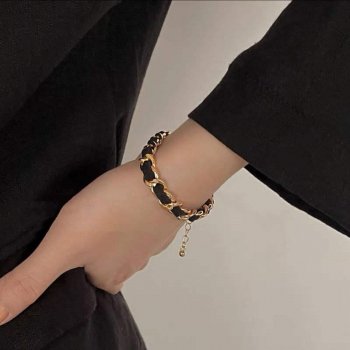 Elegant Vintage Rose Gold Black Woven BraceletOriginal price was: $14.60.$9.49Current price is: $9.49.
Elegant Vintage Rose Gold Black Woven BraceletOriginal price was: $14.60.$9.49Current price is: $9.49. -
Product on sale
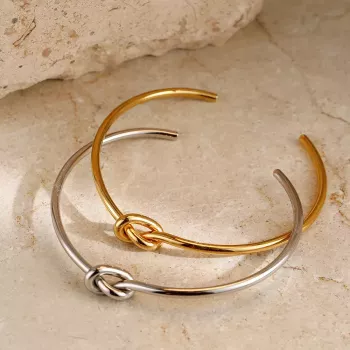 Twist Knot Stainless Steel Cuff BraceletOriginal price was: $50.46.$15.29Current price is: $15.29.
Twist Knot Stainless Steel Cuff BraceletOriginal price was: $50.46.$15.29Current price is: $15.29. -
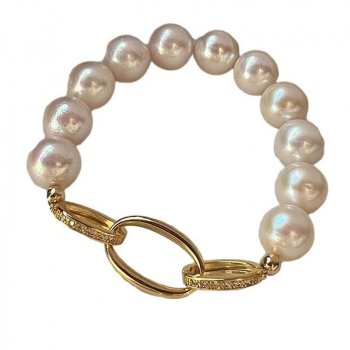 Chic Crystal & Pearl Hand Catenary Fashion Mood Tracker Bracelet$9.49
Chic Crystal & Pearl Hand Catenary Fashion Mood Tracker Bracelet$9.49 -
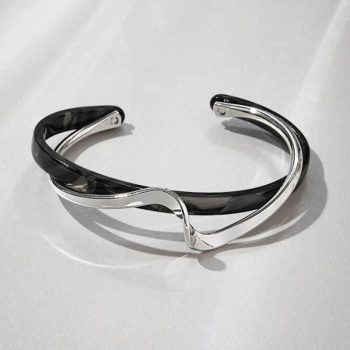 Geometric Metal Charm Bracelet for Women$14.49
Geometric Metal Charm Bracelet for Women$14.49 -
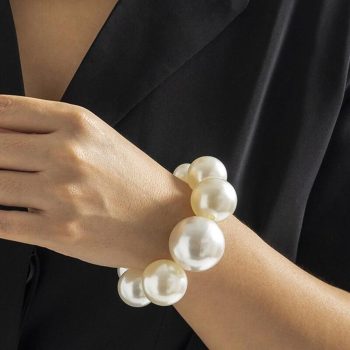 Womens Round Pearl Charm Bracelet$13.95
Womens Round Pearl Charm Bracelet$13.95 -
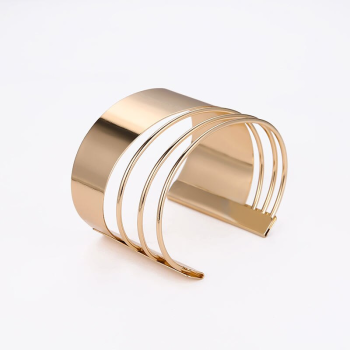 Women’s Bohemian Gold-Plated Geometric Cuff Bangle$15.65
Women’s Bohemian Gold-Plated Geometric Cuff Bangle$15.65
The following table outlines types of metals commonly used in hypoallergenic earrings:
| Type | Description | Care Tips |
|---|---|---|
| Titanium | Lightweight and strong metal; often coated with gold, silver, or rose gold for color. | Avoid contact with chemicals like chlorine and salt water; always take off before showering or swimming; can be wiped clean with a cloth dampened in warm soapy water. |
| Stainless Steel | Resistant to corrosion; won’t rust easily; available in various colors. | Can be cleaned using mild soap and water; avoid using harsh chemical cleaners as this can discolor the metal over time. Avoid contact with chlorine and salt water; always take off before showering or swimming. |
Taking proper care of your hypoallergenic earrings is essential if you want them to last long term without causing any irritation or allergic reactions. Regularly cleaning your earrings using warm soapy water, avoiding exposure to harsh chemicals, taking them off before showering/swimming, and keeping them away from moisture all go a long way towards preserving their longevity – plus they stay looking great too! After all these steps have been taken, exploring options for finding hypoallergenic earrings should come easily as there are now many more choices than ever before due to increased awareness around allergies and sensitivity issues surrounding jewelry items.
Finding Hypoallergenic Earrings
Don’t let allergies stop you from rocking the perfect pair of earrings – explore the world of hypoallergenic jewelry and enjoy wearing stylish accessories without fear!
When it comes to finding hypoallergenic earrings, there are a few materials that stand out:
Surgical Steel: This is one of the most popular metals for those with sensitive skin. It’s resistant to corrosion and tarnishing, so your earrings will stay looking beautiful for longer. Plus, surgical steel is generally safe for those with metal allergies.
- Titanium: This lightweight metal is another excellent choice for people with sensitive skin. Because it’s incredibly strong and durable, titanium won’t corrode or rust over time like other metals can. Plus, titanium is naturally nickel-free, making it suitable even for those who are allergic to nickel.
- Gold: Gold may not be as affordable as some other metals but it’s a great option if you want something timeless and luxurious. While gold contains some trace amounts of nickel, many jewelers offer gold jewelry that’s been specifically treated to prevent any allergic reactions.
Whether you opt for surgical steel or gold, shopping around for hypoallergenic earrings doesn’t have to compromise on style – find yourself an eye-catching accessory that looks just as good as non-hypoallergenic jewelry!
Frequently Asked Questions on What Earring Metals Are Hypoallergenic

Are there any other metals that are hypoallergenic?
Yes! Sterling silver and titanium alloy are both hypoallergenic earring metals.
Amazingly, over 15 million Americans suffer from metal allergies. Consider sterling silver or titanium alloy for your earrings to avoid any reaction!
How do I know if I am allergic to a particular type of metal?
If you suspect you may be allergic to a particular type of metal, the best way to find out is to get skin tested. This involves applying a small amount of the metal or its coating to your skin and monitoring any reaction.
Are there any other materials that are considered hypoallergenic?
Yes, there are other materials that are considered hypoallergenic. Sterling silver and titanium jewelry are two great options. Both metals are safe for those with sensitive skin and won’t cause an allergic reaction.
What is the difference between hypoallergenic and non-allergenic earrings?
Hypoallergenic earrings are made from materials that are less likely to cause an allergic reaction, such as irritation or rashes.
Non-allergenic earrings haven’t been tested, so there’s no guarantee they won’t cause a reaction. To be sure you avoid any potential issues, it’s best to opt for hypoallergenic earrings.
Are there any special precautions I should take when wearing hypoallergenic earrings?
Metaphor: Handling earrings like precious gems, you must take extra care when wearing hypoallergenic ones. Avoid skin contact and wear protective gloves to be on the safe side. Your ears will thank you for taking precautions!
Conclusion

You’ve come to the right place if you’re looking for hypoallergenic earrings. Hypoallergenic metals like gold, silver, platinum, titanium, and stainless steel are great choices for those with sensitive skin.
For example, Angela had struggled with skin irritation from traditional jewelry in the past. After switching to a pair of titanium earrings, she noticed an immediate reduction in her skin irritation.
With proper care and maintenance, hypoallergenic metals can be a safe option for those with sensitive skin. So, go ahead and wear your beautiful new earrings without worry!





